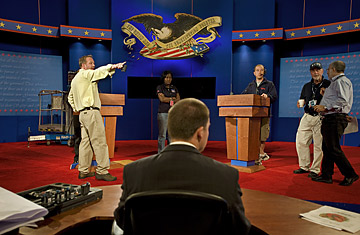
Stage and production crews make last-minute adjustments to the set of the first presidential debate, Sept. 25, 2008, at the Ford Center in Oxford, Miss.
Like so much in this election cycle, tonight's scheduled presidential debate in Oxford, Miss., is historic: never in the 48-year history of televised debates has a presidential face-off been so much in doubt mere hours before it was supposed to commence. Such is the depth of the nation's financial crisis and the creativity — selfless or craven, depending on your point of view — that until this morning, we didn't know if Jim Lehrer would have anyone to pose questions to.
But now that John McCain has committed to turning up, he and Barack Obama will take the stage tonight with their rhetoric and demeanor set to a specific temperature. "Do you want a hot debate or a cold debate?" asks Stuart Stevens, a Republican media consultant, author and screenwriter who helped prep George W. Bush for his encounters with Al Gore in 2000. "You have to decide."
According to an unscientific sampling of political consultants who have prepared candidates for presidential debates in years past, McCain will probably come out hot, with killer one-liners spilling from his lips. "McCain needs a hot debate," says Scott Reed, who managed Bob Dole's 1996 presidential campaign. "He needs to pin Obama's ears back on not being ready to be President. A subtle message from the debate has to be that this guy's not ready for prime time."
It makes sense, of course, that the candidate who is behind — as McCain is, however slightly, in most national polls — should be the aggressor in the first debate, especially since this one is scheduled to focus on foreign policy, McCain's supposed strong suit. One way to do that, says Stevens, would be for McCain to try to force Obama into conceding that the "surge" of U.S. troops in Iraq has been an unqualified success. Obama has admitted as much already in recent interviews. But having to do it onstage with McCain would be the debate equivalent of eating crow in front of 80 million viewers. Other options for McCain to go "hot" on foreign policy: make news by attacking some aspect of the Bush Administration's record, either its early strategy in Iraq or its high-handed refusal to take climate change seriously. Alternately, he could get into a contest with Obama over who has the mettle to force Iran to abandon its nuclear ambitions. "They need a game changer," says Reed.
Obama's task would seem to be simpler. As the candidate with the momentum, owing to the unraveling of the financial markets, the Democrat will probably try to steer as many questions as possible — however internationally oriented in the asking — toward the shambolic state of the U.S. economy. This would be the "cool" approach: stick to his strength, convey calm, and gracefully clear the bar of appearing presidential under pressure.
But according to these debate-prep experts, it's just as likely that Obama could try for a hot debate. "My gut is that Obama will be very aggressive," says Stevens. "He'll go in and not hesitate to prosecute what he sees as McCain's poor foreign policy judgments. That's what he did in his acceptance speech [at the Democratic Convention]. I think he feels it. I think he'll argue that his judgment was more prescient on Iraq, and he'll go from there." If he does, adds Stevens, "that exchange could be a real opportunity for McCain."
Whether hot or cold, says Steve McMahon, a Democratic strategist who helped steer Howard Dean's meteoric 2004 campaign, Obama would be wise to keep a few scraps of advice in mind. First, he should keep his answers crisp. "I would tell him to go back to his appellate argument skills and answer the question like he's answering the judge, so he doesn't bury the lead," says McMahon. "In law school, there's an old adage: answer the question first, then explain it. When you're a gifted orator, as Obama is, sometimes you explain your answer while you're giving it. That works well in a speech. But it doesn't always translate in a debate."
That's the polite way of saying that in the seemingly endless series of debates during the Democratic primaries, Obama often meandered through his answers, as if the prize went to the candidate who could produce the greatest quantity of well-spoken prose rather than the one who made the most trenchant points.
A final piece of advice, valuable to both Obama and McCain: Never forget you're on camera. McMahon says he used to tell Dean to prepare for new debates by watching tapes of old ones with the sound off, because viewers judge performance as much by visual cues as by verbal ones. "You have to remember that how you look and how commanding you appear is often more important than what you say," says McMahon. "And don't forget the cutaways. When your opponent is answering, you tend to think you're off camera. But you're not. If you scowl or shake your head, viewers are going to see it." And bad body language can turn any debate performance — hot or cold — into a dud.
(See photos of John McCain on the campaign trail here.)
(See photos of Barack Obama on the campaign trail here.)
(Click here for 10 Memorable Debate Moments.)
(See a gallery of campaign gaffes here.)
